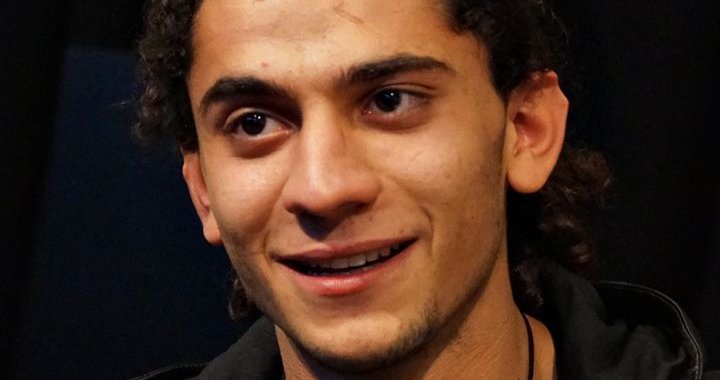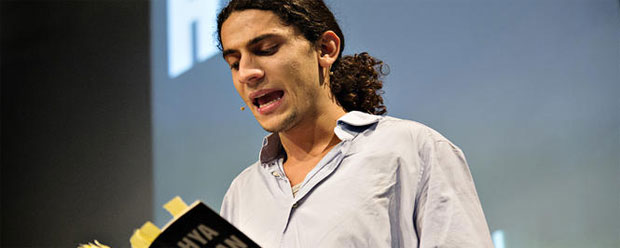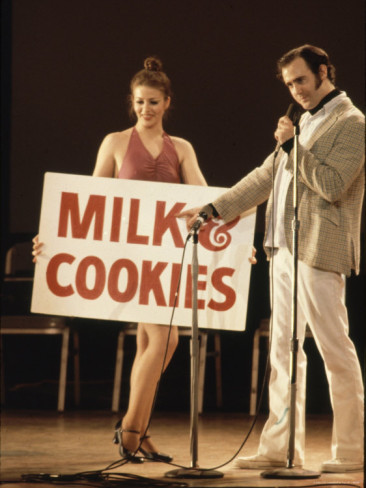
Poetry, Politics or Performance? The Story of The Teenage Immigrant Who Redefined Denmark
Jacob Stubbe Østergaard
26/02/2014
Give a baby a good meal, and in no time it will be waving its arms and kicking its legs. The energy traverses its small body within seconds.
Give a small country a great spectacle and in no time, all the newspapers will throw a collective fit and every dinner table will rustle with discussion.
This is what happened in Denmark at the end of 2013 when possibly the best spectacle of the 21st century, so far, unfolded before our eyes. From the smokiest bars of Copenhagen to the fairy-tale small-towns of Fyn to the windswept shores of North-west Jutland, within weeks, everyone was involved. At the center of it all stood the awkward figure of 18-year old poet Yahya Hassan - a delinquent with a criminal record and a history of domestic violence and incarceration in youth institutions. His first poetry book had become the most popular Christmas present of the year and outsold legendary punk generation suicide Michael Strunge to become the best selling poetry book in Danish history. Nobody was quite sure what had happened. According to some commentators, Hassan had single-handedly moved the boundaries of the speakable and the unspeakable. Rivaling politicians and columnists competed in using him to promote their particular causes. Journalists, satirists, writers and cartoonists dropped what they were doing and feasted on the young poet and his eponymous book. Hassan - beaten by his father during his childhood and chased by the police during his teenage years - lashed back at anyone who went at him. It was a carnival.
Still young and out of control, still unsculpted by the media and untempered by fame, Hassan delivered four outrageous public appearances in a row. And the audience in their living rooms ate them up. First, he walked out of a prime-time TV debate. Then he insisted on doing a recital in the middle of one of the most troubled neighbourhoods in the country; the Odense suburb of Vollsmose, many of whose muslim inhabitants had not taken lightly to Hassan's condemning poems. This poetry recital was first cancelled by the police for fear of terrorism but was ultimately carried out under the surveillance of the airforce and the military police. Things were clearly getting out of hand. Hassan then proceeded to go on TV and throw witty but unrelenting and foul-mouthed insults at anyone who criticised him in the wake of the recital.

Yahya Hassan reciting at Vollsmose. The first poetry recital in Danish history to be patrolled by the airforce
Then the inevitable happened. Hassan was cornered at Copenhagen Central Station and assaulted by an arabic man out to set the "infidel" straight. Yahya Hassan published a poem about the incident soon after, but at the subsequent court hearing, he denied any memory of having written the poem, explaining his memory problems by pointing out that he "smokes a joint now and then".
The latest twist came in January. An employee at one of the youth institutions in which Hassan had been incarcerated got fired for publishing a book describing her love affair with the poet in his 17th year. Yahya Hassan had completed the journey from derelict to deity:
16: handcuffed in a crashed car after a failed robbery.
18: other people getting rich by claiming they've slept with you.
While the nation's league of literary critics unanimously declared that Hassan was definitely a talented young man, it was obvious there was something else helping the plot along apart from just good poetry. Few would argue, after all, that Hassan was a greater poet than the previous sales record holder and national treasure, Michael Strunge.
So, what had happened? Why did this poetry book avoid the destiny of most other good poetry by promising new writers (instant obscurity save for a few approving nods from the Møllegade literati)? Hassan was a charismatic man for sure, but so were most great poets.
The first and simplest explanation for his success was that Hassan touched upon the most contentious topic in Denmark: criticism of islam and muslim immigrants. Hassan's poems dealt with an abusive childhood and contained angered and aggressive accusations against the muslim immigrant culture which fostered him. This topic didn't become any less controversial during the infamous cartoon crisis in 2006, when a Danish newspaper violated a muslim taboo by printing drawings of Muhammed the prophet, and an international crisis ensued. Now - so the analysis went - an authentic muslim immigrant had finally confirmed all our prejudice against this lower caste of immigrants living in endless and sunless ghettos at the fringes of our cities. The political significance of this revelation had caused the uproar.
Clearly this explanation could not account for the perverse amount of attention lavished on Hassan and his book. Several others had already made the leap from being part of some islamic culture to being its foremost critics. All of them have ended up as divisive but ultimately run-of-the-mill columnists. Yahya Hassan's testimony was different. It was delivered in poetry. This was something alien to a large part of the public. Poetry? Wasn't that something gay Frenchmen wrote about flowers in the 1800s?

When Yahya Hassan reached the tabloid press, their first poetry review in 20 years stated that Hassan's book contained less of those "introspective metaphors" that there are apparently far too many of in most poetry. Literary palms went to literary faces.
There is little doubt that Hassan's talent for poetry contributed greatly to the commotion. What is a good poet, after all, but someone who is able to describe something accurately? The pivots of poetry are honesty and accuracy.
No amount of visual documentation, historical accounts or psychological analysis could give you a better idea of how Romeo saw Juliet than the four lines:
"O, she doth teach the torches to burn bright!
It seems she hangs upon the cheek of night
Like a rich jewel in an Ethiope's ear;
Beauty too rich for use, for earth too dear!"
...and no amounts of news columns or TV documentaries could give us a better idea of what it's like to grow up in the worst corner of the muslim refugee diaspora than Yahya Hassan's poems. Bearing that in mind, the importance of his testimony can be ascribed to the idea that he opened the locks to the nation's unconscious. 'Vollsmose', 'Gellerup' and 'Tingbjerg' are the names of the Danish ghettos and simultaneously the names marking the collective unconscious, perceived with fear and guarded by taboos and unspoken displacement. While this was not the first time someone spoke out about muslim culture in Denmark, it was the first time someone spoke out in the language of (top shelf) poetry.
I wish I could conclude from this that what we've seen here is that rare occasion when the explanatory power of art rouses an entire nation. But I can't. Not 'art' in any traditional sense anyway. The story began with a work of art, and the poems are at the center of the commotion, but something else is afoot. The Yahya Hassan spectacle already began when, weeks prior to his book release, he gave an interview to one of the big newspapers, in which his poetic frankness came through powerfully. From there and through the book release, its astonishing sales, the Vollsmose recital and the outrageous televised debates, it gradually escalated to absurd levels. We weren't captivated by Yahya Hassan simply because of his poetry or because of his political relevance or because of his entertaining TV appearances. It was all part of the same show. In its totality, the Yahya Hassan spectacle became something far more valuable: performance art. It was worthy of Andy Kaufmann, except, of course, that it was all real. So, wasn't it just reality then? Yes. But it was more than that. It had the characteristics of performance and it was received like a performance. It was not necessarily intended as a performance, of course, but meaning does not come from intention. Meaning arises when the spectator receives an impression. To quote Shakespeare again, "All the world is a stage and we are merely players".
The sheer variety of Hassan's manifestations elevated the spectacle to a prominent place in our consciousness. It could not be ignored. Yahya Hassan didn't go away when you closed his book. He appeared again when you opened the newspaper. And when you put the paper aside and turned on the TV, there he was. And in your cocoons on Facebook and Twitter, the action replayed...
The Yahya Hassan spectacle reminded me of Andy Kaufmann's 'Milk and cookies' performance, where, after performing a formal stage show to a great audience, he invited everyone in the audience out to have milk and cookies together in a completely informal and domestic setting. This allowed the performance to spill out of the 'unreality' frame we normally place on what happens in theatres. The performance invaded the everyday reality of the spectators. Furthermore, it made explicit one of the greatest powers of performance art which is the unification of the spectators. Sharing an experience with hundreds, thousands and even millions of other people is a precious feeling, and it brings the whole group together.

The late Andy Kaufman inviting everyone out for milk and cookies, 1979
This performance device already triumphed in Copenhagen in 2004 when the week-long and 100,000 strong DISTORTION street party ended with thousands of guests being shipped on boats to the venue of the final party, thereby living through a completely new situation (sailing) together during the same event. DISTORTION frontman Thomas Fleurquin still recalls this moment as his favourite, stating that "it was like an urban ballet".
Football games and concerts thrive on the same feeling of community, but performance art reaches further because it refuses to let spectators be just spectators. It activates the spectator's personality and forces her to invest something of herself in the performance. This means that in performance, you are an assembly of individuals rather than a crowd. So it was with Yahya Hassan. We all lived through the unfolding of the story together, but everyone had his own view on it. As with great performance art, Yahya Hassan's words and actions were one when he performed them, but when they were perceived by many, they became many. So much so that the small nation of Denmark is currently in a state of nausea. When I told a friend I was going to write about Yahya Hassan, his immediate reaction was: "Don't! Everything's already been said.".
Yahya Hassan was an outsider that hardly anyone could relate to. He was the outsider who unified all us insiders - not against the outsider, but by giving us, through his poetry, a new level of understanding of the outsiders which enabled us to let go of ourselves a bit and come to terms with the parts of our own collective unconscious hidden in those alluring ghetto complexes where we dare not go. Yahya Hassan sold like sex because, like sex, he resided among the unmentionable. He came from that (forgive me...) something rotten in the state of Denmark, whose presence we've all sensed.
You can say that our desire to learn his story and read his poems was a voyeuristic desire. We were invited into an abject, strange home full of violence and shame and tragedy. We saw something we would never have been allowed to see if not for the defector Yahya Hassan.
Yahya Hassan achieved in a matter of months what reality TV has been striving for since the 20th century: letting us peek safely, together, at something we've always wanted to peek at and always been ashamed of wanting to peek at.
He can never do it again. He has lost his mystery. By now he is already part of the establishment. His name is chiseled among the other famous writers in the country. For his next book, he will have to rely solely on his writing skills and what hype his publisher may be able to produce. Yahya Hassan has already won his first literary award and been admitted to the prestigious Writer's Academy, and we are left to wait for the next great spectacle.